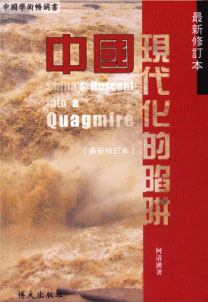Explore the collection
Showing 5 items in the collection
5 items
Book
China's Descent into a Quagmire
The author of this book is economist He Qinglian. As early as 1998, the manuscript began to circulate on the Internet. In 2005, it was published by a publishing house in mainland China and was immediately banned. The materials cited in the book discuss many aspects of China's social and economic issues today and are regarded as a representative interpretation of China's reforms by independent intellectuals. The author said that the book answers a question: What consequences has economic reform brought to China?
Article
Facts of the 1958-1962 Disaster in Fengyang County, Anhui Province
The author of this book, Luo Pinghan, is a native of Anhua County, Hunan Province. He graduated from the Party History Department of Renmin University of China and served as director and professor of the Party History Teaching and Research Department of the Party School of the Central Committee of the Communist Party of China. This book was published by Fujian People's Publishing House in 2003.
With Mao Zedong's affirmation, the system of people's communes was rapidly promoted across the country in 1958. At that time, the people's commune was both a production organization and a grassroots political power. Its rise and fanatical development are closely related to the subsequent Great Famine.
As a scholar within the system, the author’s view of history also belongs to orthodox ideology. Although this book is narrated from the official ideology of the CCP, it uses rich and detailed historical materials to comprehensively and systematically introduce the history of the People's Communes, giving it a reference value for a comprehensive understanding of this movement.
Article
Memorandum on "Three Years of Natural Disasters"
The years 1959-1961 were very unusual in the history of disasters in China and the world in the 20th century. Anyone who has experienced it will recall the starvation years and the days when people starved to death everywhere. However, due to official concealment and denial, the number of people who died in this disaster has never been officially announced.
The purpose of Jin Hui's article is to estimate the number of unnatural deaths during the three years of the 1959-1961 disaster in China. Based on public data released by the authoritative National Bureau of Statistics in China Jin concludes that about 40 million people died, which roughly matches studies by foreign scholars, who have estimated up to 45 million.
图书
#MeToo in China Archives 2018.1-2019.7
On New Year's Day 2018, Beihang University graduate Luo Xixi took the lead in breaking China's silence on the issue of sexual harassment when she publicly reported on social media that Beihang professor Chen Xiaowu had sexually harassed her. This was the first major event in China’s #Metoo movement, which has since spread from colleges and universities to other fields. #Metoo provoked an unprecedented discussion in China, and the issues of feminism and sexual harassment attracted a rare and widespread attention, with a variety of complaints, comments, studies, and advocacy articles springing up all over the internet.
<i>#MeToo in China Archives 2018.1-2019.7</i> is a compilation of sexual harassment-related articles written between January 2018 and July 2019. This archive is massive, totaling more than 2,500 pages, and is divided into three main volumes: “#Metoo in Higher Education”, “#Metoo in other fields”, and “#Metoo discussions’. Volume I and Volume II consist of individual #Metoo cases, arranged in chronological order. Articles in volume 3 can be broadly categorized into general reviews, investigative reports, personal stories, advocacy and activism, tools and resources,etc. During the #Metoo movement, many liberal public intellectuals questioned the movement, likening it to big-character posters during the Hundred Flowers campaign, and arguing that it might lead to the proliferation of wrongful convictions. It triggered heated debates, and this archive also contains a number of related articles.
The process of compiling this archive itself became an act of resistance, given the severe repression on freedom of expression and social movements. The editorial team faced tremendous challenges in collecting articles that had been deleted or published as images to bypass online censorship. It spent a great deal of time and personnel piecing together scraps of information and transcribing words in images. Reading traumatic personal stories - including those about the hardships in seeking remedies - caused psychological trauma for the editors themselves.
Nevertheless, #Metoo has also a process of collective healing, in which women with shared experiences saw each other, realized the structural problems behind sexual violence, and gained the strength to move on and push for change. Finally, during the compilation process, the editorial team also benefited from archiving efforts made by other websites and individuals, demonstrating that the rescue and preservation of people’s history is a collective and collaborative task.
This archive is published on https://chinesefeminism.org/.




